2024 Awards for Excellence Recipients
Now in its 31st year, we are proud to present the 2024 Award for Excellence Recipients.
Since 1993, we have acknowledged some of the country’s best researchers with our Canadian Cancer Society Awards for Excellence. We are proud to honour these talented individuals who have played a key role in the advancement of cancer research. These individuals have made rich and meaningful contributions, whether in advancing biomedical cancer research or conducting research that has made a major impact on cancer control in Canada.
Congratulations to all our award recipients!
Canadian Cancer Society Lifetime Contribution Prize
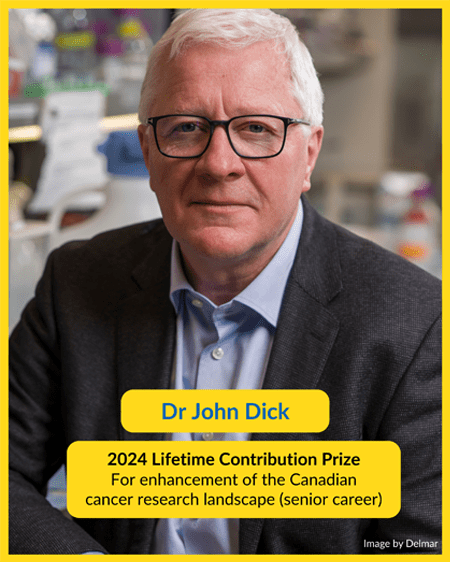 Dr John Dick
Dr John Dick
Recipient, 2024 Lifetime Contribution Prize
Senior Scientist, Princess Margaret Cancer Centre, University Health Network
Professor, Department of Molecular Genetics, University of Toronto
University Professor, University of Toronto
Helga and Antonio De Gasperis Chair in Blood Cancer Stem Cell Research
The Lifetime Contribution Prize celebrates an investigator who has enhanced the Canadian cancer research landscape beyond traditional research accomplishments – leading to significant benefits for people in Canada affected by cancer – and who is committed to passing that legacy on to the next generation of cancer researchers. Dr Dick’s nomination recognizes his key contributions to science in the areas of blood, cancer and cell biology.
“Nearly everyone in the field can attest to the monumental impact of Dr Dick’s research in advancing our understanding of human cancer biology,” says Dr Aaron Schimmer, research director of the Princess Margaret Cancer Centre, who nominated Dr Dick. “Not only has it transformed our understanding of cancer, but it has also stimulated the creation of an entirely new field of research dedicated to cancer stem cells. He has built an enduring legacy in Canadian cancer research, one that few will be able to match.”
Dr Robert Weinberg, a founding member of the Whitehead Institute for Biomedical Research and director of the Ludwig Center at MIT, agrees. “It is rare that one can assign the origins of an important field of biomedical research to a single individual, but in this case, the identification is clear and unequivocal,” he says. “The time has arrived to recognize Dr Dick's milestone research with the Lifetime Contribution Prize.”
A decade later, people realized that this principle held for many cancers – and now, of course, it has really taken off. I think the most surprising thing from a scientific standpoint is that, for 10 years, we missed the idea that this is a generalizable principle across all of cancer.
I have surrounded myself with trainees who are smarter than I am and who want to do the kind of science that shines a light into darkness. I see my lab as a crucible; we throw ideas into it and what emerges is something none of us knew – the phoenix of a new discovery. We’ve had the good fortune to do that on more than one occasion. That’s the thing I’m proud to have been able to create – an environment that gets us all thinking.
Canadian Cancer Society Inclusive Excellence Prize
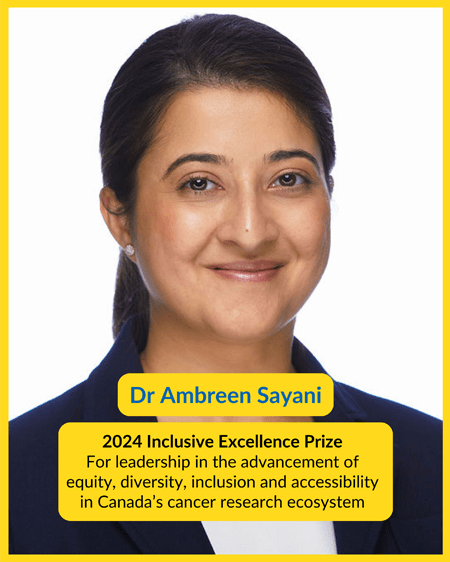 Dr Ambreen Sayani
Dr Ambreen Sayani
Recipient, 2024 Inclusive Excellence Prize
Scientist, Women’s College Research Institute, Women’s College Hospital
Assistant Professor, Institute of Health Policy, Management and Evaluation, Dalla Lana School of Public Health, University of Toronto
When asked about her work, Dr Sayani says, “My most meaningful achievement has been building a research program that reflects the values of justice, humility and accountability. I initiated the Improving Cancer Care Equity (ICCE) Lab as a space for new forms of leadership and governance to emerge – one where patients, providers and community advocates work as co-creators of knowledge.”
Currently, the ICCE Lab partners with approximately 40 people affected by cancer with trainees and students to learn more about diverse experiences, influence policy and practice and challenge the norms of who gets to produce knowledge in cancer research. Dr Sayani says, “The relationships and trust we’ve built through this work are, to me, its greatest impact.”
Sundas Shamshad, a patient advocate and senior program and policy advisor for the Alberta government, agrees. “Dr Sayani’s exceptional leadership, unwavering dedication to equity and innovative approach to patient engagement make her a deserving recipient of this award,” she says. “Her work has profoundly impacted me and countless other patient partners by empowering us to actively shape cancer research and policy.”
In 10 years, I hope to see these shifts embedded into institutional norms and funding mechanisms, with equity and inclusion shaping not only what questions are asked, but who asks them and how knowledge is created and used. The cancer research ecosystem will be stronger, more inclusive and more accountable to the people it is meant to serve.
Canadian Cancer Society O. Harold Warwick Prize
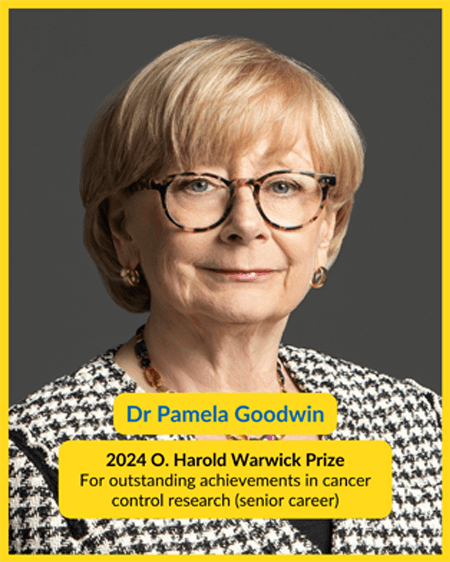 Dr Pamela Goodwin
Dr Pamela Goodwin
Recipient, 2024 O. Harold Warwick Prize
Senior Investigator and Medical Oncologist, Lunenfeld-Tanenbaum Research Institute, Sinai Health
Professor, Department of Medicine and Institute of Health Policy, Management and Evaluation, University of Toronto
“As a physician engaged in clinical practice and leading a breast cancer treatment centre at Mount Sinai, Dr Goodwin was never content to simply apply the learnings of others in delivering optimal care,” says Dr Elizabeth Eisenhauer, an oncologist and professor emerita at Queen’s University who supported Dr Goodwin’s nomination. “She has tackled some of the most vexing and controversial questions in breast cancer etiology and management over the decades – primarily in the impact of lifestyle, obesity and exercise in breast cancer development and outcomes. Her research career has been remarkable in that she has made contributions not only to population risk (obesity) with implications for prevention, but also treatment interventions (exercise and weight management) to affect cancer outcomes and laboratory study of these factors.”
Our recent large clinical trial identified a potential major beneficial effect of the drug metformin in HER2-positive breast cancer patients. We’re now working with groups around the world to replicate that result so that it can become part of clinical practice. Our data suggest that the risk of recurrence is reduced by half and the risk of death by two-thirds – so this discovery, coupled with other effective drugs targeting HER2, could go a long way toward preventing metastatic disease.
Canadian Cancer Society Robert L. Noble Prize
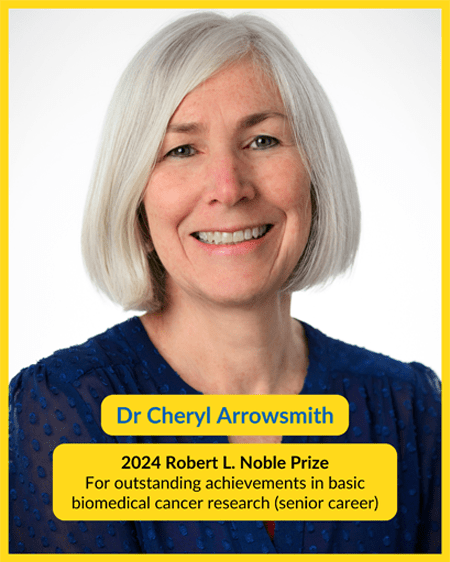 Dr Cheryl Arrowsmith
Dr Cheryl Arrowsmith
Recipient, 2024 Robert L. Noble Prize
Senior Scientist, Princess Margaret Cancer Centre, University Health Network
Professor, Department of Medical Biophysics, University of Toronto
Chief Scientist, Structural Genomics Consortium
Dr Arrowsmith was nominated for the Robert L. Noble Prize, which rewards outstanding achievements in biomedical cancer research, for her work on understanding these epigenetic protein interactions, creating new chemical probes and identifying vulnerabilities in cancer. She is also a strong advocate for new drug discovery and development, as well as a mentor and supervisor to many trainees.
“Dr Arrowsmith’s work has profoundly influenced and continues to shape the landscape of cancer drug discovery,” says Dr Aaron Schimmer, research director of the Princess Margaret Cancer Centre, who nominated her for the award. “Her research and leadership in cancer epigenetics has resulted in the development of new chemical tools for the discovery, characterization and clinical translation of new drug targets for cancer, which have received immense interest by her peers and the scientific community.”
To emphasize the significance of her work, Dr Schimmer adds, “Throughout her career, Dr Arrowsmith has demonstrated a consistent and outstanding level of achievement that have had a major impact in Canada and throughout the world. Her work has transformed cancer research and has provided essential drug discovery tools for the scientific community.”
Canadian Cancer Society Bernard and Francine Dorval Prize
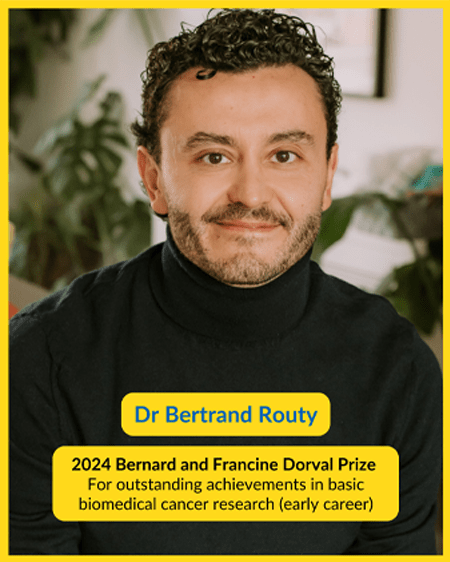 Dr Bertrand Routy
Dr Bertrand Routy
Recipient, 2024 Bernard and Francine Dorval Prize
Associate Professor of Hemato-Oncology, Université de Montréal
Clinician-Scientist, Director of the CHUM Microbiome Centre, Université de Montréal Hospital Research Centre
Dr Bertrand Routy has spent his career studying the human microbiome – the bacteria living in our bodies – and how it affects cancer. His work has shown that the bacteria in the gut can be used to predict patient outcomes after cancer immunotherapy. Immunotherapy is a treatment that helps the body’s immune system recognize and attack cancer cells. He also demonstrated in mice that altering the microbiome can enhance the effectiveness of immunotherapy. Since then, several clinical trials have supported this discovery using fecal microbiota transplantation (a way of transferring healthy gut bacteria from donated stool) and prebiotics (molecules that change the microbiome’s composition).Dr Routy was nominated for the Bernard and Francine Dorval Prize, which honours early-career researchers making exceptional contributions to biomedical research. He earned this recognition for his groundbreaking work exploring how the gut’s bacteria—known as the microbiome—can help predict and even improve how well cancer treatments work.
“Despite his young age, Dr Routy is internationally recognized as a leader in immuno-oncology, contributing significantly to the recognition of the microbiome as one of the ‘hallmarks of cancer,’” says Dr Gerardo Ferbeyre, a professor of biochemistry and molecular medicine at the Université de Montréal who nominated Dr Routy for the award. “Much like the impact of the Canadian Cancer Society (CCS) in Canada, Dr Routy’s outstanding research accomplishments and discoveries have positively impacted the lives of cancer patients. The Bernard and Francine Dorval Prize from CCS will highlight Dr Routy’s relentless dedication to improving patient care through microbiome and cancer research. He is an invaluable asset to the cancer research community.”
In the next 5 years, I believe cancer research will shift toward personalized medicine, guided by the individual bacteria and immune activity in each person’s body. As immunotherapy continues to evolve, so will our understanding of the tumour’s environment, microbiome and immune characteristics.
Over the next decade, I believe cancer research will focus on preventing and detecting cancer using the microbiome. Understanding the microbiome better will help us spot early signs of cancer and make microbiome-based treatments a regular part of care in Canada and around the world.
One of our team’s missions is to uncover how the human microbiome influences immune responses and cancer treatment outcomes. We also aim to take microbiome-based interventions from the lab to the clinic.
The CHUM Microbiome Centre, which I co-lead, has transformed cancer care by influencing oncology practices. Our discovery that antibiotics negatively impact the microbiome and the effectiveness of immunotherapy has already changed clinical practice. In addition, our ways of altering the microbiome have made new treatment approaches possible. Our ongoing efforts focus on learning more about how cancer immune responses are controlled and developing innovative ways to improve cancer treatment.
If I could choose a superpower to speed up our research, it would be the ability to quickly read the human microbiome in real time. This would help us understand how the microbiome controls a person’s response to immunotherapy, identify the people most likely to benefit and determine which patients may need microbiome-targeted treatments – ultimately making personalized cancer care possible.
Canadian Cancer Society William E. Rawls Prize
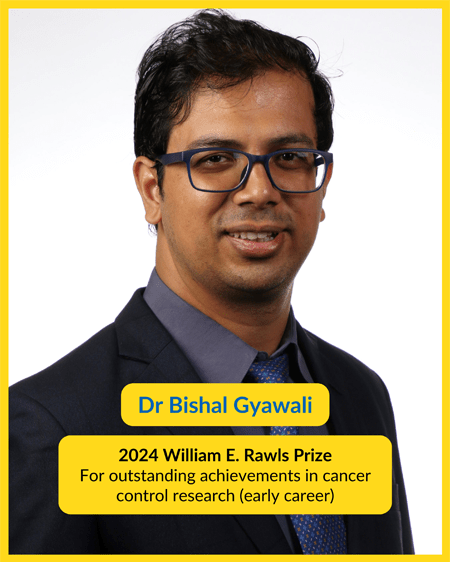 Dr Bishal Gyawali
Dr Bishal Gyawali
Recipient, 2024 William E. Rawls Prize
Associate Professor, Department of Oncology, Queen’s University
Scientist, Division of Cancer Care and Epidemiology, Queen’s Cancer Research Institute
Medical Oncologist, Cancer Care of Southeastern Ontario, Kingston General Hospital
Dr Bishal Gyawali’s research tackles cancer from every angle – from evidence-based care and support to the financial and policy issues that surround cancer. His work has helped improve clinical trials so that researchers can prioritize the interventions most likely to have high value for people affected by cancer. The William E. Rawls Prize, which celebrates early-career investigators whose work has led – or is likely to lead – to important advances in cancer control; Dr Gyawali’s nomination recognizes his work to improve the approval process for new cancer drugs, put patients at the centre of research and advocacy efforts and mentor a diverse range of trainees from across Canada.
“Dr Gyawali is a highly skilled oncologist, a great communicator and a force for good for local and global cancer control,” says Dr Winette van der Graaf, professor of medical oncology at the Netherlands Cancer Institute and Erasmus Medical Center, who supported his award nomination. “He introduced the term ‘cancer groundshot,’ encompassing activities on established interventions that can help treat or prevent cancers and that can be implemented easily and affordably. This can help people around the world.”
Dr Ian Tannock, an emeritus professor of medicine and medical biophysics at the University of Toronto who also supported the nomination, adds, “In my view, he is not only the most productive and thoughtful young oncologist in Canada, but the leading contender for that title globally.”
A superpower to convince the policymakers and stakeholders about the need to invest and implement in cancer “groundshot” (interventions we already know work) alongside the “moonshot” of chasing new innovations. There is a lot of inequity within Canada, as well as across the globe, with regard to cancer treatment. Most people with cancer die not due to lack of access to the newest drugs, but due to lack of access to timely and appropriate cancer care that has been around for decades. This prioritization of access to high-value interventions is the first step to achieving true equity in cancer care.
